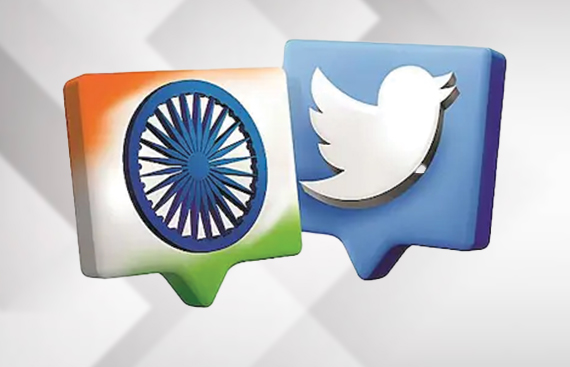Twitter Row: All you need to know

It’s quite a rare scenario when a tech-giant goes toe-to-toe with the ruling government. On Tuesday, Twitter, a US-based social media platform dragged Indian government to Karnataka High Court over its demand to take down content under IT Rules, 2021.
Here is all you need to know about the current tussle:
On February 2021, Government of India notified new Information Technology (Intermediary Guidelines and Digital Media Ethics Code) Rules, 2021, in the exercise of powers under section 87 (2) of the Information Technology Act, 2000.
Under the new ruling, it mandates a grievance redressal system for over the top (OTT) and digital portals in the country. This was necessary for the users of social media to raise their grievance against the misuse of social media.
The social media firms have to appoint a chief compliance officer and have a nodal contact person who can be in touch with law enforcement agencies 24/7.Social media platforms will have to assign a grievance officer who shall register the grievance within 24 hours and dispose of it in 15 days.
Further, the emphasis is given on removal of content that is explicit in nature related to women and children. And, government can ask the social media platform to remove any content which is seen as threat to national security, national integrity, sovereignty, and friendly relation with foreign countries, etc,.
They also will have to publish a monthly report about the number of complaints received and the status of redressal.
There will be three levels of regulation for news publishers —
Level 1 - Self-regulation by the publisher,
Level 2 - Self-regulatory by the self regulatory body of the publisher, headed by a retired judge or an eminent person, and
Level 3- Oversight mechanism framed by Information and Broadcasting Ministry, including codes of practices and a grievance committee.
Many social media platforms like Facebook, Twitter, and WhatsApp have raised concern over the unavailability of ‘safe harbour’ protection given to intermediaries under Section 79 of the IT Act, under the new rules, which will lead to criminal liability upon the employees for non-compliance by intermediaries.
The mandate to help authorities to trace originality of continuous message by breaking end-to-end encryption protocol is deemed problematic by the intermediaries, which violates right to privacy of the user.
Another concern was that the government can use this rule to suppress the voice of journalists, politicians, and academician who oppose the government decisions in the name of national security.
The Current Development
![]()
The Indian Government over the years asked Twitter to take down several accounts and tweets. In one instance, the Ministry of Electronics and Information Technology (MeitY) warned the platform to remove accounts and content that supported independent state of Sikh or Khalistan. Post that spread misinformation about protest by farmers and COVID-19 handling by the Indian government were also to be removed.
The Indian government said the social media firm has failed to comply over removal request, despite their legal standing.
Despite several warnings over months, Twitter has failed to accept the request by the government and is liable to criminal proceedings. Consequently, has resulted in violation of India’s Rule of Law.
According to Twitter, the Indian government has ordered to remove content without giving notice to the author, and some political content which were anti-government posted by political parties and critics that accounts to violation of freedom of speech. Thus, requested for a judicial review of the procedural requirements of India’s IT Act. The government officials are misusing their power to curb down any kind of disagreement that come up against the government, added.
Conclusion
![]()
Earlier WhatsApp sued Indian government over new IT Rules and now its Twitter. It is interesting to note that the resilience from the foreign social media company gave platform to Indian Social Media platform like Koo to grow up. The company’s attitude towards the law of the land shows its arrogant nature. It becomes duty of the foreign companies to comply with rule of the land they are monetizing from here. These social media firms have complied with IT rules of European Union to function, but it becomes problematic for them to follow Indian Laws.
It is also noticed that platform like Twitter has tried over hand on governments of various countries. They have taken down the account of then-serving US President Donald Trump, removing verified mark from Indian Vice-President Venkaiah Naidu , and temporarily blocking account of Indian Home Minister Amit Shah and Indian Ex- IT Minister Ravi Shankar Prasad.
The ex-CEO of Twitter Jack Dosery in 2018 admitted Twitter to be ‘left-leaning’ and its algorithm suppress right wing content and spread information of certain political ideologies. Thus, in turn, their argument of freedom of speech becomes shady.
With the diversity in India, there are a lot of unsocial elements working towards disturbing the peace and harmony of the country. It has been found out that a lot of misinformation is circulated on such platforms by cross-border users, and it becomes important for the government to track down the origin of such information. And the new IT Rules gives that provision to the government.
But at the same time, the Indian government has misused its power to curb voice against their functioning which is danger for the democratic country. The accounts of influential personalities, political leaders, and journalists are taken down by the government those shown disconsent with government policy in the name of national security.
It is important for both the parties to follow the law in righteous manner; the freedom of speech should not be compromised by any means, and it becomes duty of the platform users and the company to restrain themselves from spreading any anti-social content.
